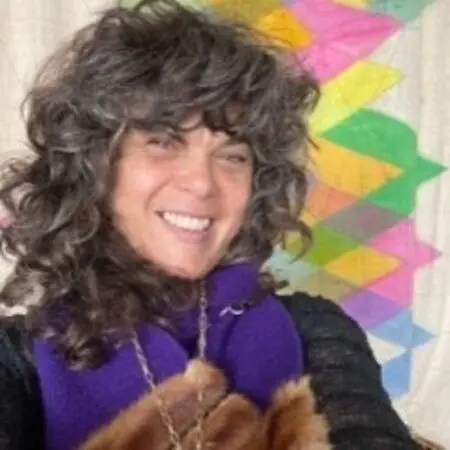Melina Finkelstein

Melina Finkelstein is a distinguished rug designer, nonobjective painter, and the creative force behind Melina Finkelstein Rugs, Peace Industry, and Casa Muñiz Design. Based in the Bay Area and trained at the School of the Art Institute of Chicago, she has spent more than two decades shaping a practice that blends fine art, craft traditions, and global collaboration. Her work includes a range of customizable rug collections, most notably her iconic Peace Industry felt rugs handcrafted in Nepal and her Casa Muñiz flatweaves produced in Oaxaca.
Throughout her career, Melina has earned recognition for both her artistic innovation and her preservation work. She was honored by The Metropolitan Museum of Art in New York for her contributions to safeguarding Iranian felt rug traditions, reinforcing her commitment to cultural continuity and ethical design. Her studio practice is grounded in fair trade values, artisan partnership, and a dedication to supporting women makers across international craft communities.
Melina continues to expand her influence as a designer, educator, and advocate for workplace gender equality. Her work is shaped by collaboration, intuition, and respect for the skilled hands behind each piece. Whether developing custom commissions, leading production across global workshop teams, or creating original paintings, she works with intention and purpose, celebrating art that is meaningful, deeply made, and rooted in human connection.
• School of the Art Institute of Chicago - BFA
• Female Design Council
• TACO
What do you attribute your success to?
I attribute my success to the unlikely path that shaped my creative and professional identity. I began not in textiles but in paint, learning as an abstract geometric artist to translate intuition into form. Modeling in the fashion industry came later, revealing both its surface glamour and its deeper inequities, especially for women seeking fairness and safety. Twenty three years into my current field, I now work at the intersection of art, design, and global manufacturing, with a practice rooted in collaboration, cultural respect, and technical precision. My felt carpet work is deeply connected to Nepal, where every rug is the result of meticulous handcrafting, sustained communication, and mutual trust between my Oakland studio and the artisans in Kathmandu. Navigating industries often shaped by masculine power structures has only strengthened my commitment to leading from feminine intuition, community, and integrity. The support of creative networks such as the Female Design Council, Bay Area Made, TACO, and local spaces like the Drivers Plaza community garden reminds me that artistry is not a solitary act; it is a shared and evolving conversation that keeps softness and connection at the center of my work.
What advice would you give to young women entering your industry?
My advice to young women entering this industry is shaped by experiences that were not always easy to navigate. Throughout my career I have faced moments of harassment, exploitation, and invisibility, and I learned early that reporting unsafe situations can cause people to distance themselves rather than offer support. At one international carpet show in Paris, the threats escalated so severely that I had to hire a bodyguard because the event could not guarantee my safety. These experiences harden you, but they also refine your instincts and clarify what you will and will not tolerate. So my guidance is this: never enter a business partnership without legal protection, and never confuse someone’s enthusiasm especially male enthusiasm with ethical behavior. Trust your intuition, protect your boundaries, and build alliances with people who demonstrate integrity through their actions, not their words.
What are the biggest challenges or opportunities in your field right now?
One of the greatest challenges in my field is the vulnerability of small, independent makers to global political shifts. Years ago, trade sanctions forced me to move my production from Iran to Nepal, a transition that required retraining an entire team, reestablishing supply chains, and rebuilding a manufacturing ecosystem from the ground up. It was a profound reminder that geopolitical decisions, far removed from the studio, directly impact artisans, production methods, and cultural traditions. Yet within that disruption also came opportunity: the chance to strengthen new partnerships, preserve traditional techniques in a different region, and create a more resilient, adaptive model for craft-based manufacturing.
What values are most important to you in your work and personal life?
I value work that is deeply made art that honors skill, tradition, and the human hands behind every piece. I reject shortcuts and insist on authenticity over mass production, grounding my practice in intuition, empathy, collaboration, and creative power. Bringing feminine energy into industries often shaped by masculine structures is essential to me, as is building my business entirely on my own terms. I value independence, legal clarity, and the protection of creative ownership, especially as a woman working in male-dominated spaces. Above all, I believe in creating art that carries meaning, identity, and intention, work that reflects both the maker and the communities who help bring it to life.